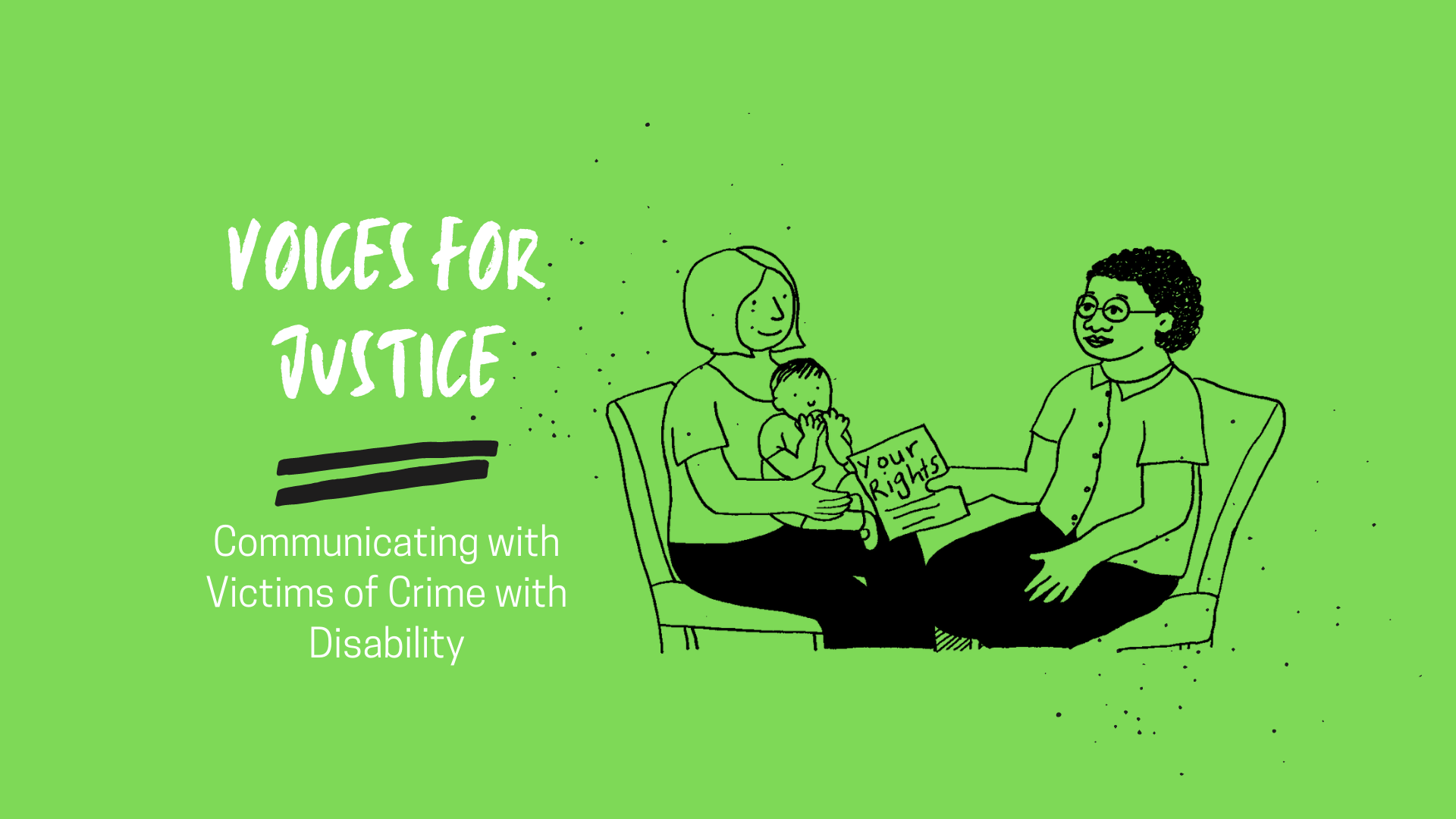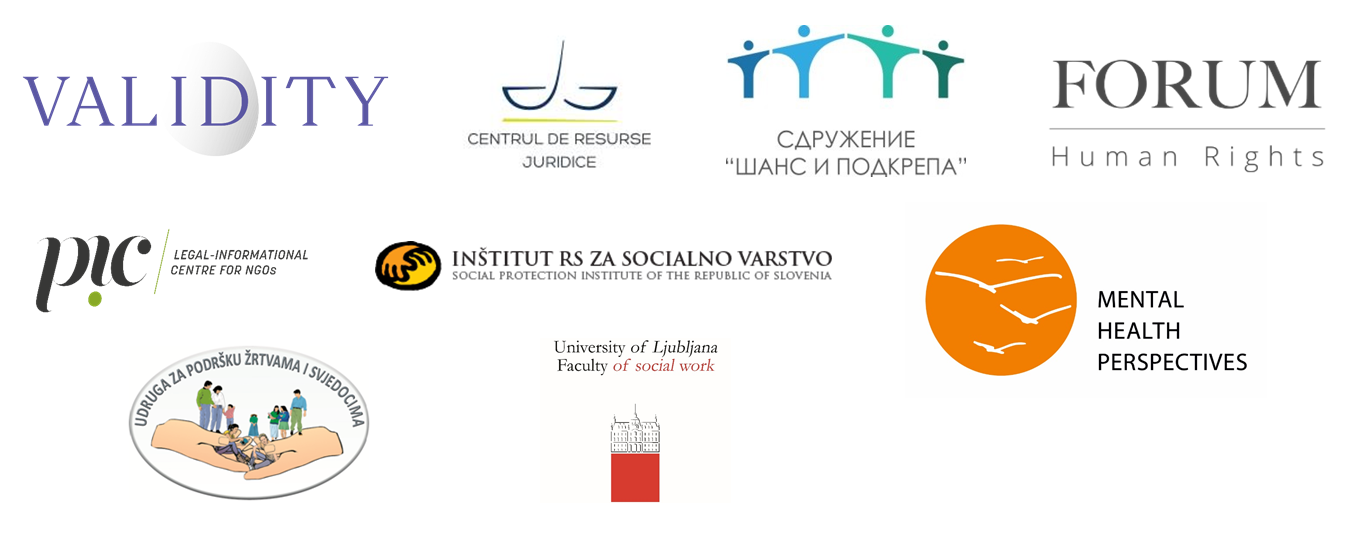People with disabilities are more likely to be victims of crime and less likely to receive justice. A major challenge for people with disabilities is having the right information presented in the right way, so that they understand their rights, and know how to report a crime and how to engage with the legal process. A challenge for professionals working in the justice system is that they often have little experience communicating with people with disabilities and a poor understanding of their needs. A strong system of law exists at the United Nations and the European Union to address these challenges but it is not always well understood or implemented. This project aims to address these gaps by creating practical guidelines for people with disabilities who are victims of crime, as well as for the judges, lawyers, police, social workers and others who defend their rights. The project will also help policy-makers at EU level be better informed and support the development of international standards to protect the rights of people with disabilities who are victims of crime.
Project description:
The project focuses on creating practical tools for people with disabilities who are victims of crime, to help ensure that they can participate actively in criminal justice processes. The EU Victims’ Rights Directive (2012/29/EU) guarantees victims the rights, among others, to understand and be understood, to information, and to be heard. Where criminal justice professionals fail to provide victims with disabilities with accessible information, do not have the knowledge and tools to communicate in ways victims with disabilities can understand, or cannot support victims with disabilities to express their needs and experiences, these rights are violated and victims do not receive justice.
People with intellectual disabilities, people with psychosocial disabilities and people with physical disabilities are the focus of the project, including those who experience multiple and intersecting discrimination because of their disability together with their gender, ethnicity, or other status. The two-year project started in July 2020, is co-funded by the European Commission and is taking place in seven EU countries (Romania, Slovakia, Czechia, Bulgaria, Slovenia, Lithuania, Croatia).
The project builds on the expertise and experience of the Validity Foundation and the Consortium partners. Validity and project partners have previously investigated access to justice for children with mental disabilities, and developed tools to enhance the skills of legal professionals to represent children with mental disabilities in a project entitled ‘Innovating European Lawyers to Advance the Rights of Children with Disabilities‘. In parallel, Validity is coordinating a second EC co-funded project focused on making criminal justice systems child-friendly in three EU countries, by improving how individual assessments are conducted for children with disabilities, children who are unaccompanied, or children who are deprived of parental care. The two projects are being implemented in close cooperation, and it is anticipated that the findings, outcomes and deliverables will be complementary.
Legal background
In terms of the wider international context, the nexus between the obligations set out in the EU Directive (2012/29/EU) together with the more recent EU Strategy on Victims’ Rights 2020-2025, the EU Disability Strategy 2010 – 2020, and the United Nations’ Convention on the Rights of Persons with Disabilities (CRPD) are critical. Although the EU acceded to the CRPD in 2010 and the Convention has been ratified by each of the 27 EU Member States, there is a lack of clarity as to how it applies in combination with existing EU law, and even less what that means in practice for people with disabilities. Further, findings by the European Commission in May 2020 illustrate that transposition of the Victims’ Rights Directive has been insufficient in most EU Member States. There has been almost no assessment of whether and how transposition of the Directive into national legal systems has affected the ability of persons with disabilities to access their rights. This project aims to improve access by people with disabilities victims of crime to their rights under the Directive and to inform the development and implementation of the international legal framework with evidence and promising practices.
Objectives
The project aims to:
- Enhance access for beneficiaries to their rights under the Victims’ Rights Directive and related acquis through developing an evidence base and set of multi-disciplinary recommendations on access to information and effective communication in criminal justice processes for people with disabilities who are victims of crime;
- Improve access to supports and accommodations for beneficiaries to communicate effectively and be understood, as well as to provide professionals in the justice system with improved skills and practical tools to communicate effectively with beneficiaries;
- Promote on-going cross-disciplinary cooperation on information provision and communication by victims of crime with disabilities across criminal justice disciplines;
- Disseminate the new knowledge and materials to key target audiences in each project jurisdiction and across Europe; and
- Contribute to the on-going consistent and coherent development, review and implementation of the Victims’ Rights Directive, the UN CRPD and the European Charter of Fundamental Rights.
Activities:
Research and data collection. The development and implementation of a research methodology involving data collection in seven countries through desk and field research. The purpose is to develop an evidence base and set of multi-disciplinary recommendations on access to information and effective communication in criminal justice processes for people with disabilities victims of crime, from initial reporting, interview and evidence collection, through to participation in court proceedings and accessing victim support services.
- Development of handbooks and practical guidance. Guidebooks and information packs will be produced for: i) professionals working with victims of crime; ii) judges, prosecutors, judicial personnel; iii) lay-advocates and victim support services; and, iv) people with disabilities who are victims of crime. These will be adapted and translated into the project languages.
- Cross-disciplinary cooperation. Conferences will be organised in all project countries to bring together victims of crime with disabilities and stakeholders from different professional and disciplinary backgrounds who work with them.
- International dissemination. An international symposium will be organised in Brussels with people with disabilities, policy makers, NGOs and other experts to promote the project and the issues addressed by it and highlight recommendations for EU action.
Perioada de implementare:
1 July 2020 – 30 June 2022
Partners:
- Validity Foundation – Mental Disability Advocacy Centre (Hungary) brings 18 years substantive expertise in research, advocacy and strategic litigation on the rights of people with disabilities.
- Centrul de Resurse Juridice (Centre for Legal Resources, Romania) has excellent experience and skills in providing complex legal and professional support to people with disabilities who have experienced human rights violations.
- Shans i Podkrepa (Chance and Support, Bulgaria) brings 14 years experience working with people with disabilities, people from different ethnic groups (including Roma people), women and elderly people, developing new methodologies of social work, and providing direct support.
- Udruga za podršku žrtvama i svjedocima (Victim and Witness Support Service- VWSS, Croatia) brings specialised expertise in providing information, psychological and legal aid to victims of crime, and operates a national call centre for victims of crime.
- Fórum pro lidská práva (Forum for Human Rights, Czechia and Slovakia) brings expertise in human rights advocacy, strategic litigation, research and awareness-raising on the rights of vulnerable groups, including persons with disabilities, and the principle of non-discrimination.
- Psichikos Sveikatos Perspektyvos (Mental Health Perspectives – PSP, Lithuania) brings extensive experience in disability-rights, including implementing a crucial project on enhancing procedural rights of suspects and accused persons with intellectual and/or psychosocial disabilities in criminal proceedings.
- Pravno-informacijski center nevladnih organizacij (Legal-Informational Centre for NGOs – PIC, Slovenia) brings legal expertise in protecting, supporting and defending marginalised and vulnerable groups and provides legal assistance to more than 1,000 people with disabilities each year.
- The Inštitut Republike Slovenije za socialno varstvo (Social Protection Institute of the Republic of Slovenia – IRRSV, Slovenia) leads the research and data collection component of the entire project. It has three decades of experience in evaluation and monitoring service provision for people with disabilities in Slovenia and has coordinated cross-border projects.
- The Faculty of Social Work from the University of Ljubljana (University of Ljubjlana, Slovenia) will develop the research methodology for the project and implement it in Slovenia. They have developed action research methods and researched the rights of people with disabilities since the 1980’s.
Full name of the project
Information and Communications: Cornerstones of Justice for Victims of Crime with Disability (878604 — InfoComPWDs).
JUST-AG-2019 / JUST-JACC-AG-2019.
The contents of this project represent the views of the project partners only and are their sole responsibility. The European Commission does not accept any responsibility for use that may be made of the information it contains.
Funding:
This project is co-funded by the European Union’s Justice Programme (2014-2020).



